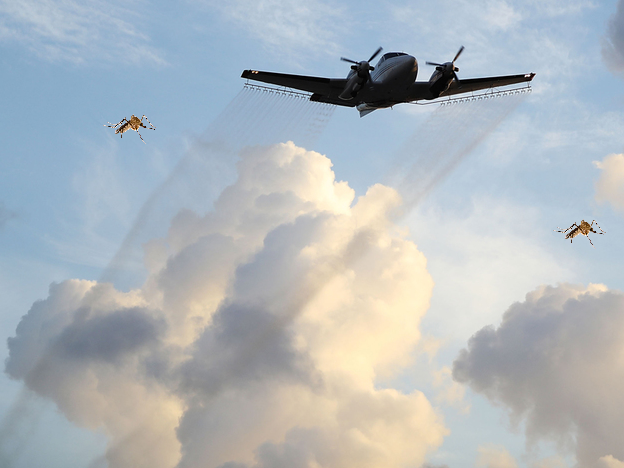Controversial Mosquito Fumigations
When it comes to fumigations of mosquitoes, Miami-Dade has a budget of ten million to control the populations of mosquitoes. In some areas, mosquitoes have gotten so intense that people have implemented small drones.
May 6, 2018
As the days get hotter, and summer nears, mosquitoes swarm the Southern United States. This has resulted in years of complaining from neighborhoods due to irritating bites and the never-ending groups of accumulating insects in certain areas: these mostly pertain to rainy areas, specifically Miami-Dade. To put a stop to this mosquito crisis, the county has a bi-yearly (or more if necessary) aerial fumigation, where they spray gases for pest control. However, not only do populations keep on growing but also the controversial issue of whether this is a decent form of protecting us from diseases like Zika and Malaria.
What is most concerning to the public is the effects on our health. These pesticides are known to effectively kill mosquitoes; according to the county’s website for mosquito control, “Miami-Dade County’s Mosquito control inspectors use the most effective methods, techniques, equipment and products to control the mosquito population. We want to enhance your quality of life and reduce the possibility of mosquito-transmitted disease.” The problem does not seem to be that they kill mosquitoes, on the contrary, lots of people benefit from the reduced risks of contracting infectious diseases. Moreover, Florida can almost completely guarantee its citizens that it is Zika free, comforting expecting mothers, and any others prone to issues with the virus. However, it is important to clarify that they are aerially fumigating, meaning it is not a controlled form of pest control.
Since they are spraying this mosquito killer through the air, there is a greater likelihood that things like our soil, water and air are getting polluted in the process. The decrease in air quality can be due to nanocomposites, which are minute particles that are found inside these aerially distributed substances. The residue of these fumigations as previously mentioned are these nanocomposites, which are designed to continue flowing through our air since they are well adapted to the different weather and changing humidity.

It is important to consider all of the possible effects that killing off mosquitoes can bring, especially the way that we do it in Florida. We should not have to worry about our health and safety of our drinking water or air if that is what it costs to lessen the number of mosquitoes that we see each day.
— freshman Laila Moussa
Because of this resistance to basic elements, airplane-displaced pesticide against mosquitoes in Southern Florida serves as a crucial part of our air pollution. Through constant fumigation (due to our state’s nature to being a breeding ground for the insect), these seemingly minuscule particles build up to serve as a possible threat to our breathing. The same principle applies to our water supplies and soil. These particles are easily soluble in the water, affecting its contents; just like chemically treated fertilizer, the nanocomposites blend into the soil. For all of the following, it is almost impossible to remove this residue from their new environment.
Not only do these fumigations kill mosquitoes, but they are also accountable for the death of other vulnerable insects like butterflies and native bees — which are already under attack population wise against other European invasive bee species. Small reptilians, amphibians, and small birds are simultaneously affected: lizards and birds are forced to look for other sources of nourishment, especially birds, causing them to get nearer to community residencies searching for quick food. By killing off our mosquitoes, the fumigations lead to a chain of events that can slowly deteriorate our local ecosystems. This correlates to the nano-composites, affecting the fish in our waters and any life that derives from the soil like plants, worms, other insects, our products and so forth.
On the other hand, there are strong opposers to stopping this type of mosquito control. There tend to be three main arguments: mosquitoes are the insects that transmit the most diseases, they overall have no positive effects on humans and mosquitoes can kill over 750,000 people a year if they are not controlled. However, these are not completely true. To begin with, the idea of mosquito control is a myth. There is no real way to correctly manage the insect’s population since mosquitoes lay their eggs in water, and it would be more difficult to kill these using the typical aerial fumigations since they do not target specific areas affected by mosquitoes. While it cannot be denied that mosquitoes are the insects that transmit most blood-borne diseases, it is important to mention that there are only three to two mosquitoes (depending on what part of Florida that you live in) that transmit diseases compared to the eighty species that reside in the state. Lots of these mosquitoes pollinate flowers or serve as food for local birds and fish, thus revealing that mosquitoes play an important part in different ecosystems.
“Aerial mosquito fumigations are supposed to be effective in getting rid of aggressive mosquitoes that spread Zika in places like Florida. This is meant to protect people from getting infected with the virus but although it is not directly infectious to people, it can make us sick when not properly used on crops or near areas with water. It can be effective but also be really dangerous,” freshman Sara Ebrahimi said.
Seeing as Miami-Dade has been through this process already at the beginning of this year’s February, aerially spreading pesticides seems to be a valuable solution to our itching bumps throughout our mosquito seasons; it is regularly cheap for our county to do this instead of precisely targeting harmful or swarmed areas of mosquitoes, as the aforementioned takes less time and effort from government workers. Nonetheless, it is important to consider what can happen if we take the easy way out when we fumigate these pesky insects.
























